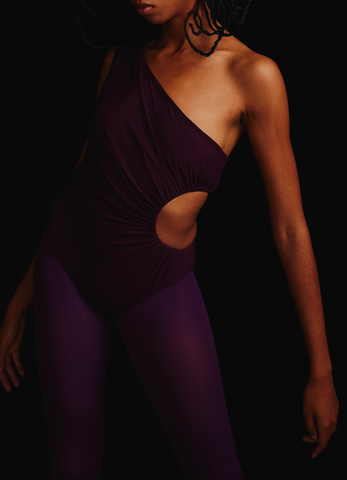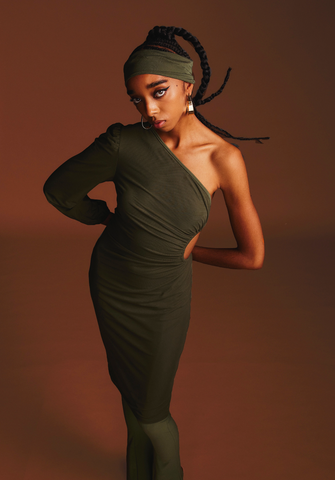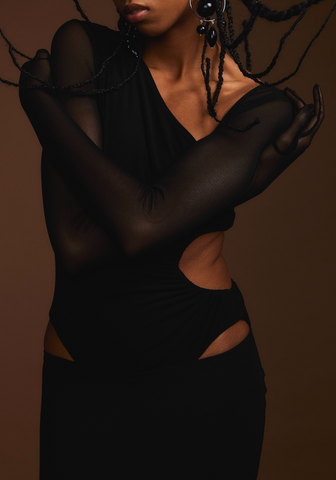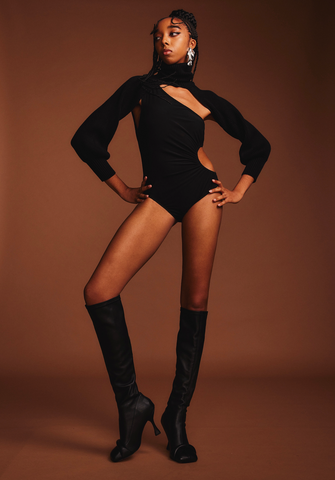JAMILA MARIAMA, meaning "a beautiful gift from God", is a twin sister duo contemporary womenswear brand defined by beautiful fabrics, vibrant colors, and complimenting silhouettes.
The founder and creative director, Jamila Jones, oversees all of her designs from the pattern making to print artwork and construction of the garment. Her creations empower and connect women through design; highlighting women of color and their beauty and strength.
Jamila runs her business with her sister, Maya Jones; who brings wholesale, marketing, and styling expertise to the company. The brand was founded in 2016 and is based in Brooklyn, New York.
Jamila graduated from University of Cincinnati's DAAP with a Bachelor of Science in Fashion Design.
What would be your dream job or role?
I always envisioned myself being in fashion design, so I'm really happy that I'm still doing it. I wanted to move to New York the moment after I came to visit for the first time so I can say I'm living my dream. I work for a brand called Frye as my 9 to 5 designing womenswear and it’s nice to be able to have that steady income and then do my personal brand and whatever I want as a separate interest.
Are you able to find balance in your life while juggling both your professional career and personal brand?
It's hard because fashion is not an industry where you make a lot of money in general and then I live in one of the most expensive cities in the world, so it's hard. But I do enjoy working in a corporate environment and I feel like I learn a lot that I can take into my own brand. Obviously it's 9 to 5 every day, so there's not a lot of time to work on your own passions.

What would you wear in your version of Utopia?
I love prints and dresses so I would say some type of comfortable flowy printed dress, probably some type of Ulla Johnson dress.
What project or collection are you most proud of and why?
When I was laid off from Macy’s in 2020 due to the pandemic, I started making masks for friends and family. I just needed something to do and a lot of people didn't have access to re-wearable masks that they could wash. So I started doing that and it turned into a little capsule collection that Tessa actually featured in the store. I ended up hand-dying crop tops and matching masks and it was nice because I had creative freedom to be able to start sewing again and doing things by hand. Also, I was able to help people and provide masks at the time and it was the first collection I had in a store. Then obviously my senior collection in school is going to be something I always remember. That is your proudest moment because it's the final moment of your college journey.
Where are all your designs being produced? And are you still sewing anything yourself?
I'm not sewing anything right now because I haven't had the time and capacity to but I do really enjoy sewing, especially the first prototypes for new designs. The collection Idlewild is going to have in for the Trunk Show is all manufactured in New York in the Garment District. This is also my first time having pieces produced because before, like with my tie-dye collection, I had done everything by hand. When I decided to have more colors and sizes for my brand it was exciting to finally figure out the manufacturing process and nice to do it locally in New York.
What's your favorite fabric to work with?
I like to work with some types of crêpe or lightweight suiting and don't really enjoy working with slippery fabrics like silk, it's just annoying. But I do like some types of crepe because it has the drape and doesn't wrinkle as much. It's also not slippery and it holds shapes well. So if you want a strong silhouette it could be manipulated to do a lot and I enjoy that versatility.

Could you name one designer or design house that you are inspired by and why?
I would say Aurora James from Brother Vellies. She started her brand with shoes mostly being handmade from suede and leather in Africa. Her whole brand was focused around the idea of sustainable fashion and ethical production. She started the brand focusing on these aspects but went beyond what most people might think about when it comes to sustainability. I feel like often people think about sustainability as how the fabric is produced or made but don’t view it as a pillar in their company. James has it built into her company from top to bottom thinking of the whole with how she treats her employees, the way everything is shipped, and wherever she is selling her pieces. Then during the pandemic she started the 15% Pledge. So I really look up to her because her brand is more than just about the clothes and everything is really beautiful.
In the time you have worked in the industry have you seen any shifts in terms of more diverse representation?
I think about how Macy's did have a diversity and inclusion officer the entire time I was there but remember when everything was happening during the pandemic with George Floyd and everyone was posting the black squares and all this weird stuff. Then all of a sudden companies were hiring diversity and inclusion officers and I just wondered how these Fortune 500 companies didn't have one in the first place. That was really shocking to me and that they didn’t have employee resource groups for all the different professionals in their company. I was surprised that these brands we shop all the time were missing such a key component within their organization and felt that a lot of them created these positions and groups out of guilt during the pandemic. But you do have to start somewhere and that was one the big shifts I saw specifically in the last few years.
Who would you say your brand is for?
That's a hard question for me because I don't wanna put my brand in a box but from the girls that have bought pieces in the past few years I would say they are similar to Tessa and I in a way. We’re not tied to a certain aesthetic but are strong minded and independent while having versatility in the way we dress. I’d also say that they’re creative and in different fields whether that be marketing, fashion, bloggers, or stylist but all have a sense of fashion about them. For my age range, I wouldn’t say my mom would necessarily wear my clothing, but probably between twenties and late thirties. So, I do always have a hard time with that question but definitely a strong minded fashionable woman.
How do you find yourself being empowered not only through design, but also your day to day style?
I started reading this book a couple of days ago and the author describes what fashion is, which can be a very complex term, saying that it doesn't only provide function when you wear a coat outside but that it captures the mysterious aspects of being human and I really liked that. I see wearing clothes as almost a costume for however you feel or who you wanna be that day. Sometimes if I'm feeling happy I might wear a printed dress because that's how I'm feeling, or if I don't feel super confident for a presentation or work I'll wear something with a strong shape to feel powerful or just make myself feel a bit more confident because fashion is very emotional. So it's more than just the functionality of clothing but how you feel or how you want to feel and I think clothing can help to make you feel empowered.
What would you recommend to someone that is struggling to find their own personal style?
It's interesting now because a lot of people mimic their style from everything they are seeing on Instagram. So it's easy to find your style based on what other people are wearing, but to your point, is that really finding your own style or is it just wearing what everyone else is? I would say to wear what makes you feel comfortable instead of trying to force your style based on how you want people to portray you. But to do that, you have to try a couple of different looks.
I definitely formed my style from my mom and different women in my family. Traveling is also a big source of inspiration for me with my personal style and when I would travel in high school or college I would come back with a few different pieces that I felt were new and different. I do understand that not everyone can afford that luxury but I think it would help people find their personal style and that could also be as simple as getting out of your hometown, state, or school.

Do you feel like your style and design has evolved as you’ve grown as an individual and as a professional?
Oh definitely, especially being from Ohio. There's definitely different pockets of fashionable people and places there, but being from Dayton there isn’t a lot of fashion inspiration. Back then I didn't have Instagram and TikTok so a lot of my inspiration came from Teen Vogue, Seventeen, and just watching TV. But now I'm living in New York and being around so many different types of people I definitely feel like I've mimicked different elements of the various people, places, and stores I have visited. Obviously, as I get older and mature, there are certain things I wouldn't wear anymore but I also feel like when I look back at old pictures there are still pieces that are core to my style and haven’t changed. For example, prints and dresses have always been something that's been consistent with my style as well as a mix of soft and hard dressing. I love a flowy top with a baggy boyfriend jean or a bomber jacket and mixing softer elements together with it. I definitely still fall into trends that go around but try to buy clothes that could be versatile and not for a certain time or occasion.
How do you see the fashion industry becoming more equitable?
I think something I've seen more, besides having diverse models in terms of race and ethnicity, is the inclusion of plus size models and curvy models and while it's not all the way there yet I have seen more size diverse models in the last few years in marketing and in runway shows. For example, I was just watching the Margiela Couture Show, because I looked at the pictures but hadn't seen the video of the full show, and they had a performer that was disabled and had one arm and I just thought that was amazing to open the show with someone that was diverse in that way.
So I do think companies, more so couture companies, are able to be more free with their creativity and are at the forefront of doing it. I do think it still needs to trickle down to more corporate everyday companies like Target or Macy's and having people like that present in commercials that are on TV. But also not just to do a one time photo shoot or this Black History Month photoshoot just because it's February but to do it and make companies feel more comfortable representing these people in advertising.
It’s also in the hiring process, even down to the company I work at. I've been here since May and we just now have a black woman at the VP level at the company, which is good and it makes me hopeful but it shouldn't be something that is still a first. Just having people that are diverse in age, race and ethnicity having conversations with the CEO is important. So, not just hiring people at an entry level position that are diverse, but making sure they're promoting us to get to that next level to be in the room with the higher ups and giving us a chance to give our perspective.

How do you kind of navigate championing other minority designers while also running and growing your own business?
I think naturally with my personality, whether you're black or come from the same type of background, I've always just naturally wanted to help people because I’ve been helped so much myself.
But it's interesting because when I was working at Macy's in the employee research group I was in, we started a mentorship program. At the time I was an assistant associate and they were trying to help us meet different Black VPs and senior managers within the company, but because it was optional there was someone high up that expressed they felt too much pressure to be the black professional that has to mentor others. They just didn’t feel it was their responsibility and that made me think about mentorship in a different light because even the managers that were my mentors weren’t a woman or black but they didn’t have to be. So I would encourage people to be more open minded and to look for mentorship from those that aren’t just like you, but to find ones that you are comfortable with and that will pour into your growth. It’s nice if they’re just like you but they don’t have to be. I also would encourage anyone to find a community of people within your job, even if it’s just as casual as going to lunch or chatting on teams, it can take the pressure away from someone being your mentor.
I'm wondering if you have any other favorite books you could recommend for us right now?
I definitely would recommend checking out Aurora James' new book, Wildflower. It's about her upbringing, how she got into fashion, and the creation of the 15% pledge.
What is your go-to coffee or tea drink?
I can’t drink a lot of coffee because I get too jittery, but if I do drink too much caffeine I do a cappuccino every now and then. But I can't do three cups a day like most people. Otherwise I love hot chocolate and ginger tea but if I had to give one answer I’d say ginger tea.
Check out Jamila Mariama website here. Follow Jamila Mariama on Instagram.
Idlewild is hosting a trunkshow featuring Jamila Mariama collection February 23, 24, 25 in-store.
